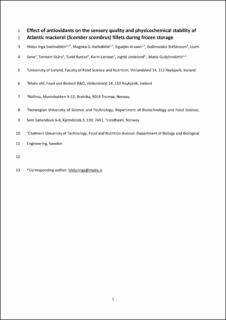Effect of antioxidants on the sensory quality and physicochemical stability of Atlantic mackerel (Scomber scombrus) fillets during frozen storage
Sveinsdottir, Hildur Inga; Karlsdottir, Magnea G.; Arason, Sigurjón; Stefansson, Gudmundur; Sone, Izumi; Skåra, Torstein; Rustad, Turid; Larsson, Karin; Undeland, Ingrid; Gudjonsdottir, Maria
Peer reviewed, Journal article
Accepted version

View/
Date
2020Metadata
Show full item recordCollections
Original version
https://doi.org/10.1016/j.foodchem.2020.126744Abstract
This study aimed to evaluate the shelf-life of mechanically filleted well-fed Atlantic mackerel during frozen storage at −25 °C and effect of treatment with antioxidants (sodium erythorbate and a polyphosphate mixture) and different antioxidant application methods (dipping, spraying and glazing). Both physicochemical measurements and sensory analysis were applied. Antioxidant treatments prolonged shelf-life of mackerel. Sensory analysis indicated that untreated fillets had a shelf-life of less than 2.5 months, while all antioxidant treated fillets exceeded that. The most effective treatment, dipping fillets into a sodium erythorbate solution, yielding a shelf-life of 15 months. Physicochemical methods used to evaluate degradation of lipids in the fillets were free fatty acids (FFA), lipid hydroperoxides (PV) and thiobarbituric acid reactive substances (TBARS). They did not correlate with sensory results and might therefore be a questionable choice for evaluation of oxidation and development of rancid flavour and odour in complex matrixes such as Atlantic mackerel.